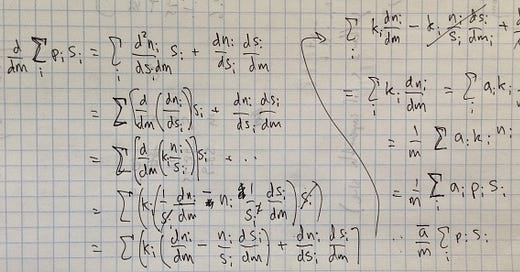Paul Krugman responds to Noah Smith’s tale of disillusion with mathematical economics:
I share much of his cynicism about the profession, but I think he’s missing the main way (in my experience) that mathematical models are useful in economics: used properly, they help you think clearly, in a way that unaided words can’t.
I’ve heard such claims a thousand times. But after enduring four years of Princeton economath, and publishing two pure theory pieces (here and here), I am convinced that most economath badly fails the cost-benefit test.
Let’s start with a truism: Some people have a comparative advantage in economic intuition; others have a comparative advantage in mathematical economics. The superior path to economic understanding varies from person to person and topic to topic.
Now let’s move to an obvious fact: Out of the people interested in economics, 95% clearly have a comparative advantage in economic intuition, because they can’t understand mathematical economics at all. Even professors in top undergraduate economics programs (MIT and Caltech aside) avoid economath because they know their students can’t hack it.
What about the the remaining 5% who do understand some mathematical economics? An optimist would point out that this 5% does the lion’s share of original economic thinking. Perhaps economath is vital scaffolding for intellectual progress despite its low pedagogical value.
Not really. Empirically, even the 5% gain most of their economic understanding via intuition. Don’t believe me? Show a typical economist a theory article, and watch how he “reads” it: He reads the abstract and introduction, flips the theory pages, then reads the conclusion. If math is so enlightening, why do even the mathematically able routinely skip the math?
You could reply that mathematical economics shows that economic intuition is often wrong. I beg to differ. My experience: When mathematical economics contradicts common sense, there’s almost always mathematical sleight of hand at work – a sneaky assumption, a stilted formalization, or bad back-translation from economath to English.
Krugman interestingly argues that economath helps economists grasp claims that seem intuitive after the fact:
Take the centerpiece of my early career, the work on increasing returns and trade. The models… involved a fair bit of work to arrive at what sounds in retrospect like a fairly obvious point: even similar countries will end up specializing in different products, and because there are increasing returns in many sectors, this will produce gains from specialization and trade. But this point was only obvious in retrospect. People in trade were not saying anything like this until the New Trade Theory models came along and clarified our thinking and language. Trust me, I was there, and went through a number of seminar experiences in which I had to bring an uncomprehending audience through until they saw the light.
I believe Paul. But I have a slightly different interpretation: His seminar audiences needed the economath because their economic intuition was atrophied from disuse. I can explain Paul’s models to intelligent laymen in a matter of minutes. Since they know no economath to blind them, they don’t need economath to grasp the obvious-once-you-point-it-out.
Economath isn’t utterly useless. Last year, for example, I used economath to convince my colleagues about a subtle signaling fact. The main intellectual benefit of studying economath, though, is that it allows you to detect the abuse of economath.
Example: During my undergraduate independent study with Bill Dickens, I told him that compensating differentials and efficiency wages were the same. Bill used math to show me I was wrong. The only reason I erred, however, was that the textbook discussion of efficiency wages was incorrect! When I showed Bill the textbook, he admitted that the author had mistranslated the math of efficiency wages back into English. Kudos to Bill, but this incident made me respect economath less, not more as he hoped.
When I teach Ph.D. microeconomics, there’s still a lot of math. I don’t just teach my students economics; I also teach them what they need to know to succeed in the economics profession. Still, I strive to give them a better intellectual experience than I had. I only teach the math a typical econ Ph.D. might actually use one day. I use the time I save to interweave the subjects economists have to know to genuinely understand the world: psychology, history, political science, and philosophy for starters. I’m still not satisfied, but it’s a start.
The post appeared first on Econlib.





>You could reply that mathematical economics shows that economic intuition is often wrong.
The math happens to match your intuition, many people's intuition is different. Correct math is the same among all people. Intuition varies. Math is the evidence that *your* libertarian intuition is correct and people should believe you instead of the intuition of others.
Marshall was wrong-- math is a good vehicle of inquiry too. What typically happens is this:
1. I have an intuitive idea in economics, e.g., tariffs would increase efficiency as a way to counteract an income tax.
2. I write it up. Most of the time I discover in writing it that hte idea is wrong, and it dies immediately.
3. I do a numerical example. This might well kill it too.
4. I do a formal model. By this point, ordinarily the idea will survive, but in crippled, restrained form. I discover what hidden assumptions were in my mind. These assumptions are often so strong that I kill the idea as being too limited in scope.
5. If the idea survives, though, I translate it back into words in the Intro to the article. People read that part, and skip the proofs. But without the math, I would (a) make overstrong claims, and (b) make false claims. Every good idea can be presented intuitively, in words. But so can lots of bad ideas.